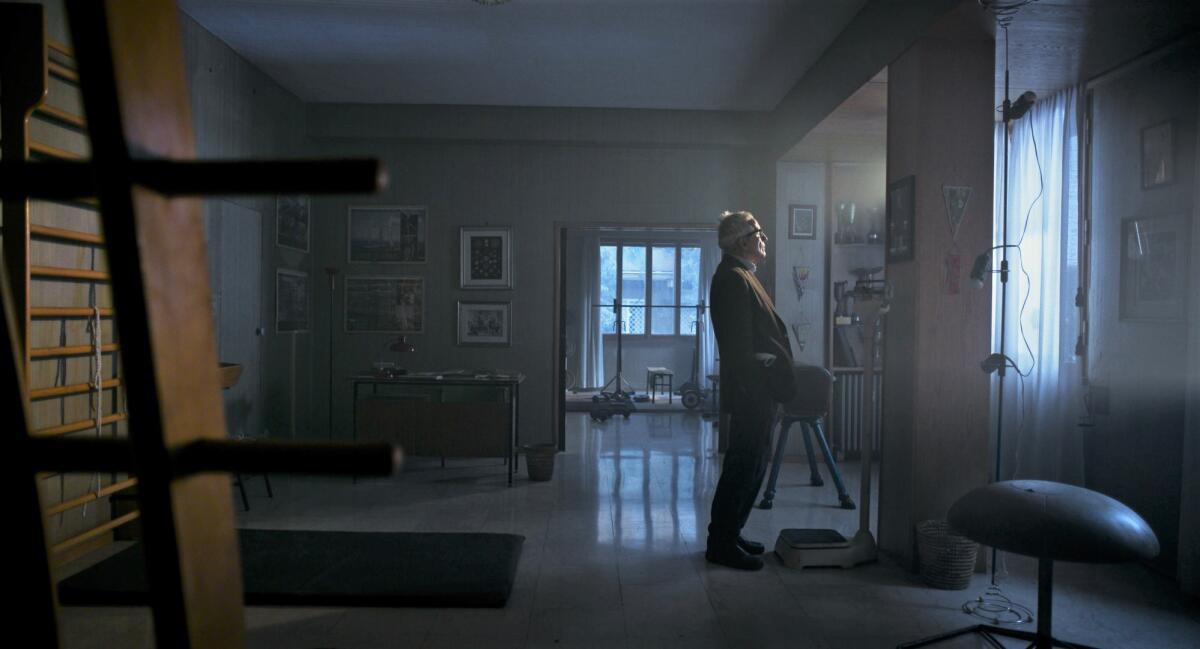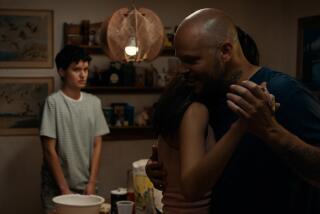Review: Twin’s suicide continues to mark the work of Marco Bellocchio in ‘Marx Can Wait’

- Share via
The Times is committed to reviewing theatrical film releases during the COVID-19 pandemic. Because moviegoing carries risks during this time, we remind readers to follow health and safety guidelines as outlined by the Centers for Disease Control and Prevention and local health officials.
The holidays are when many families hope for peaceful convergence instead of eruptive conflict, or at least warmth instead of anguish. When Italian filmmaker Marco Bellocchio (“Fists in the Pocket,” “The Traitor”) joined his extended family in December 2016 for an eagerly awaited, multi-generational reunion in their hometown of Piacenza, he saw an opportunity to address a longstanding sorrow he could sense in his older siblings: the too-brief life of his twin brother, Camillo, who committed suicide in 1968 at age 29.
Filmed conversations followed with his five surviving brothers and sisters, all in their 80s, and Camillo’s girlfriend’s sister — plus a priest and a psychiatrist for good measure. These form the heart of Bellocchio’s deeply personal documentary “Marx Can Wait,” a redemptive analysis and confessional of sorts about Camillo’s place in their large, emotionally chaotic Catholic family, and his death’s effect on the director’s art and psyche.
The viewer is made a guest of sorts to an unusually open, illuminating, yet never knowingly uncomfortable, excavation of memories, regrets and speculations. Augmented with family photos, archival footage and allusive clips from Bellocchio’s more semi-autobiographical films, “Marx Can Wait” couldn’t have been an easy project for the director to realize — guilt is an ever-present note in the sadness. But even at its most emotionally awkward or loose, it signals a filmmaking sensibility where Bellocchio — whose nearly 60-year career has been built on a provocative rendering of the social and political fractures around him — is refreshingly averse to viewing his own past through rose-colored glasses.
The portrait of Camillo that emerges is one of a sensitive postwar boy turned disaffected ’50s youth whose aimlessness was in part due to a lack of self-worth he felt when he compared himself to his ambitious and achieving brothers. Photos and home footage reveal not only a delicate, guarded handsomeness — a bit of the “likable bad boy,” as one brother recalls him being — but also a “veil of melancholy” that never left him. The siblings admit being blind to how much real pain there was behind it. The details of Camillo’s life and death — what he said, did, wrote — become springboards for guilt-tinged guesswork. It’s all very human, understandably messy and naturally affecting.
The struggle to understand certain kinds of suffering is exemplified in the story behind the title. When the director’s star was ascendant in the late ’60s after his (still) powerful debut, “Fists,” heralded an edgier, more subversive and political new Italian cinema, Bellocchio tried to convince his brother that all he needed was the same epiphany he’d had about revolutionary change. Camillo simply responded, “Marx can wait. I have other needs.” It would be their last conversation.
Years later, Bellocchio appropriated that line for his 1982 film “The Eyes, the Mouth,” in which he portrayed the family fallout from a twin’s suicide. Brief excerpts from that and other movies where the director addresses death, suicide, mental illness and family grief speak to one of this film’s more fascinating themes — the relationship among trauma, creativity and healing.
Not that Bellocchio is saying he’s solved anything by continuing to return to this tragedy in his work. It’s to this rigorously intellectual and self-questioning filmmaker’s credit that he doesn’t present these parts of his oeuvre as anything but conscience-stricken stabs at making sense of it all. To some extent, Bellocchio has made “Marx Can Wait” so he can accept that there’s inadequacy in any such endeavor and that all someone like him can do is keep making films as honestly as possible. That simple poignancy about loss and time is there in this stark remembrance’s final images: a succession of photographs of himself and Camillo side by side through the years, in which only Bellocchio keeps aging.
‘Marx Can Wait’
In Italian with English subtitles
Not rated
Running time: 1 hour, 31 minutes
Playing: Starts Dec. 15, Laemmle Monica, Santa Monica
More to Read
Only good movies
Get the Indie Focus newsletter, Mark Olsen's weekly guide to the world of cinema.
You may occasionally receive promotional content from the Los Angeles Times.










